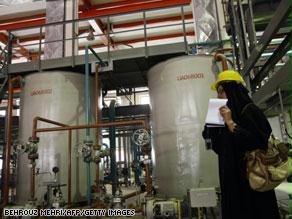The United States, Russia and France expressed concern about Iran's new fuel deal proposal on Wednesday, signalling that the Islamic republic's recent overture would not stop a vote on sanctions in the UN Security Council, DPA reported.
The Security Council was to meet later in the day on a new set of punitive measures meant to curb Iran's access to advanced nuclear technology and money for its uranium enrichment programme.
The US, France and Russia formally conveyed their answer to Iran's plan, which has the support of Brazil and Turkey, by handing a joint document to International Atomic Energy Agency (IAEA) chief Yukiya Amano in Vienna.
Under the May 24 proposal, Russia and France would make nuclear fuel for a medical-use research reactor in Tehran within a year. In return, Iran would place about half of its current stock of low-enriched uranium in storage in Turkey.
The US, Russia and France originally offered a similar deal last October, but had asked that the low-enriched uranium be delivered to them directly so that it could be turned into fuel.
Washington's envoy at the IAEA said in Vienna that the US would view a fuel deal as a positive step, but added that Iran's request to receive fuel within a year set "an unrealistic timeline."
Ambassador Glyn Davies also pointed out other concerns, including Iran's boosting of uranium enrichment levels since February and its refusal to enter multilateral talks on its nuclear programme.
Speaking at an IAEA board meeting, Davies added that the value of the planned confidence-building gesture of shipping out 1,200 kilogrammes of uranium was decreasing as Iran keeps building more stock of this material.
"Only when faced with the prospect of sanctions did Iran express any semblance of accepting a proposal on the Tehran research reactor made eight months ago," Davies said.
Meanwhile, US Secretary of State Hillary Rodham Clinton said on a trip to Ecuador that she thought the Security Council measures were "the most significant sanctions that Iran has ever faced."
They have been under consideration since April after Iran's decision to boost its enrichment programme and concerns voiced by the IAEA over possible past and present military objectives in Tehran's nuclear activities.
The US expected a strong majority of the 15-nation UN body would support the measures, while council members Lebanon, Turkey and Brazil openly oppose them.
Some of the new measures include bans on investment in uranium facilities and on work toward ballistic missiles that can carry nuclear weapons, and a binding inspection regime on Iran's cargo ships.






